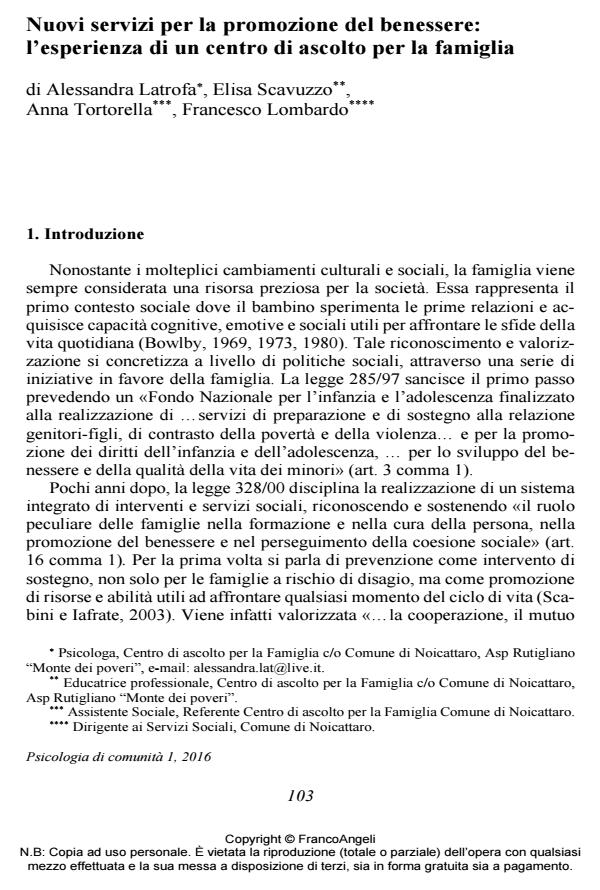New services for wellness promotion: the experience of a centres for family support
Journal title PSICOLOGIA DI COMUNITA’
Author/s Alessandra Latrofa, Elisa Scavuzzo, Anna Tortorella, Francesco Lombardo
Publishing Year 2016 Issue 2016/1
Language Italian Pages 13 P. 103-115 File size 219 KB
DOI 10.3280/PSC2016-001009
DOI is like a bar code for intellectual property: to have more infomation
click here
Below, you can see the article first page
If you want to buy this article in PDF format, you can do it, following the instructions to buy download credits

FrancoAngeli is member of Publishers International Linking Association, Inc (PILA), a not-for-profit association which run the CrossRef service enabling links to and from online scholarly content.
The new approach promoted by the WHO (1948) concerning the concept of wellness has had significant psychosocial implications. At the national level, it is also observed a number of legislative measures concerning social policies aimed at the realization of initiatives and services to enhance and promote skills and resources rather than prevent or reduce disadvantages. The “Centri di ascolto per le famiglie (Centres for family support)” is a service aimed at the promotion of skills and resources in the perspective of empowerment and resilience, the family being considered not as a bearer of needs to be met but as the active beneficiary of services. The authors therefore describe the experience of one of a "Centre for family support" within the Apulia region.
Keywords: Wellbeing, empowerment, resilience, life skills, family support, social politics.
- Anda R.F., Felitti V.J., Walker J., Whitfield C.L., Bremner J.D., Perry B.D., Dube R., Giles W.H. (2006). The enduring effects of abuse and related adverse experiences in childhood: A convergence of evidence from neurobiology and epidemiology. European Archives of Psychiatry and Clinical Neurosciences, 56(3): 174-186. http://dx.doi.org/10.1007/s00406-005-0624-4
- Bowlby J. (1969). Attachment and loss: Vol. 1. Attachment. New York: Basic Books.
- Bowlby J. (1973). Attachment and loss: Vol. 2. Separation: Anxiety and anger. New York: Basic Books.
- Bowlby J. (1980). Attachment and loss: Vol. 3. Loss: Sadness and depression. New York: Basic Books.
- English D.J. (2012). Longscan: Life Events, Maltreatment and Youth Outcomes Conference on Child Abuse and Neglect April 18, 2012. Testo disponibile al sito: https://www.pal-tech.com/intranet/OCAN/3035_English,_D.-Family_Sta-bility_Life_Events.pdf
- Felitti V.J., Anda R.F., Nordenberg D., Williamson D.F., Spitz A.M., Edwards V., Koss M.P., Mark J.S. (1998). Relationship of child abuse and household dysfunction to many of the leading causes of death in adults. American Journal of Preventive Medicine, 14(4): 245-258.
- Giannotta F., Ciairano S., Weichold K., Testa S., Silbereisen R. (2008). Un intervento di life skills nella scuola media per la prevenzione dell’uso di sostanze (A life skills intervention against substance misuse in an Italian middle school). Psicologia dell’Educazione, 2(3): 325-344.
- Istat (2007). La violenza e i maltrattamenti contro le donne dentro e fuori famiglia. Ministero per i Diritti e le Pari Opportunità, Roma.
- MacKenzie M.J., Kotch J.B., Lee L.C. (2011). Toward a cumulative ecological risk model for the etiology of child maltreatment. Children and Youth Services Review, 33(9): 1638-1647. http://dx.doi.org/10.1016/j.childyouth.2011.04.018
- Mercuriali E., Ferruzza E., Boatto E. (2006). La prevenzione nella prima infanzia: i gruppi per i genitori. Psicologia Clinica dello Sviluppo, 10(3): 511-522. DOI: 10.1449/2321
- OMS Organizzazione Mondiale della Sanità. Preambolo alla Costituzione dell’Organizzazione Mondiale della Sanità; New York, luglio 1946; entrata in vigore nell’aprile 1948.
- Quilici M., a cura di (2010). Storia della paternità: dal pater familias al mammo. Roma: Fazi
- Rappaport J. (1981) In praise of paradox; a social policy of empowerment over prevention. American Journal of Community Psychology, 9: 1-25. DOI: 10.1007/bf00896357
- Rosa R.A. (2014). Promozione delle Life Skills e corretti stili di vita negli studenti universitari attraverso il Cooperative Learning. Formazione & Insegnamento. Rivista internazionale di scienze dell’educazione e della formazione, 11(4): 285-291.
- Scabini E., Iafrate R. (2003). Psicologia dei legami familiari. Bologna: Il Mulino.
- Sirigatti S., Stefanile C., Giannetti E., Taddei S., Giangrasso B., Nerini A., Casale, S. (2004). Abitudini alimentari e life skills: valutazione di un intervento. Atti dell’Accademia dei Fisiocritici in Siena, 23: 91-156. Testo disponibile al sito: http://www.researchgate.net/publication/235654839
- Walsh F. (2006). Strengthening family resilience. The Guilford Press a Division of Guilford Publications, Inc., trad. it. La resilienza familiare. Milano: Raffaello Cortina.
Alessandra Latrofa, Elisa Scavuzzo, Anna Tortorella, Francesco Lombardo, Nuovi servizi per la promozione del benessere: l’esperienza di un centro di ascolto per la famiglia in "PSICOLOGIA DI COMUNITA’" 1/2016, pp 103-115, DOI: 10.3280/PSC2016-001009